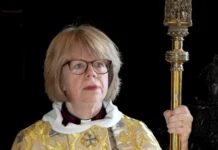Once in Royal David’s City. Silent Night. It Came Upon a Midnight Clear. For many of us, the list of cherished Christmas carols is a long one. Each piece conjures memories, deep longings, a moment of Christmases past. And like the Spirit of Christmas yet to come, they point to a hope for the future.
One of the benefits of being a cleric is that by the time the liturgies of Christmas eve and Christmas day have been celebrated, most of the hymns on that hit list have been sung. While I can honestly say I love all Christmas carols, if I had to claim one as my favourite, I would have to say, it’s “O Come, All Ye Faithful.”
Many scholars credit John Francis Wade as the one who composed both the music and the lyrics in Latin, sometime between 1740 and 1743. I fondly recall belting out Adeste Fideles, as a testimony to my high school Latin classes. Others suggest that the hymn is much older and the author unknown. Over the years more verses have been added and subtracted, scores arranged and rearranged.
From my earliest memories it was the first carol sung at the midnight Mass. The stillness pleaded for by the organ prelude is broken by the opening notes. The congregation, young and old, broken and whole, rich and poor, if able, are brought to their feet. And the first words…O Come all ye faithful… break in. In that moment, the deep longing of Advent, our pleas of “O come, o come, Emmanuel” and “O come quickly” are transformed. Now we are the ones called.
O come, all ye faithful. These words are to me an invitation for all to step inside the scene and run with the shepherds to catch a glimpse of the Christ child. They are an enticement to fasten our souls to the throng of faithful believers who down through the ages have longed to see again. They are a summons to throw off grief, cynicism and worry and to make haste for Bethlehem with anticipation.
God of God, Light of light, verse two enjoins us to the words of the Nicene Creed that sets the foundation of our faith, words we utter Sunday by Sunday and long to put into practice in our everyday. Sing choirs of angels, sing in exultation, Sing all ye citizens of heaven above. Verse three bids us, by heavenly descant, to join our voices with the celestial realm as heaven bends low to kiss the earth at Christmas.
Yea, Lord we greet thee, born this happy morning, Jesus, to Thee be glory given; Word of the Father now in flesh appearing. I never, ever, ever, get through verse four without being reduced to tears. Maybe it’s the musical arrangement, a half diminished seventh chord or the momentum of the choir. Maybe…
It’s deeper than that. At Christmas we greet God in Jesus as we are; broken and blessed, confident and afraid, anxious and calm. At Christmas, we wend our way to Bethlehem buoyed by memories that bless us, hurts that pursue us, grief that burdens us, anxieties that possess us and fears that grip us. And though we may still be gripped by the Covid 19 pandemic, we draw near together trusting that peace will come in our homes, in our communities and in ourselves. We draw near in the knowledge that in Jesus we are reconciled, loved and set free, that grief and sorrow are put away.
We come to Christmas this year leaning on the voices of the faithful who go with us, the celestial chorus that has gone before us, and the faith that is still in us to greet the Christ Child. From the manger God greets the longings of our hearts and souls with love and names us; beloved, forgiven and blessed.
So come. In Newmarket, in Grafton, in Peterborough and Scarborough and Bramalea. Come. From the comfort of your own living room, lift your voice and sing. From a pew through the veil of a mask, join the choirs of angels and sing. Come let us adore him, Christ the Lord.


